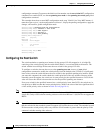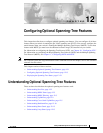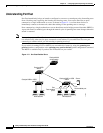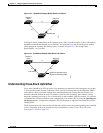
11-22
Catalyst 2950 Desktop Switch Software Configuration Guide
78-11380-05
Chapter 11 Configuring RSTP and MSTP
Configuring RSTP and MSTP Features
Specifying the Link Type to Ensure Rapid Transitions
If you connect a port to another port through a point-to-point link and the local port becomes a
designated port, the RSTP negotiates a rapid transition with the other port by using the
proposal-agreement handshake to ensure a loop-free topology as described in the “Rapid Convergence”
section on page 11-3.
By default, the link type is determined from the duplex mode of the interface: a full-duplex port is
considered to have a point-to-point connection; a half-duplex port is considered to have a shared
connection. If you have a half-duplex link physically connected point-to-point to a single port on a
remote switch running RSTP, you can override the default setting of the link type and enable rapid
transitions to the forwarding state.
Beginning in privileged EXEC mode, follow these steps to override the default link-type setting:
To return the switch to its default setting, use the no spanning-tree link-type interface configuration
command.
Restarting the Protocol Migration Process
A switch running both MSTP and RSTP supports a built-in protocol migration mechanism that enables
it to interoperate with legacy 802.1D switches. If this switch receives a legacy 802.1D configuration
BPDU (a BPDU with the protocol version set to 0), it sends only 802.1D BPDUs on that port. An MSTP
switch can also detect that a port is at the boundary of a region when it receives a legacy BPDU, an MST
BPDU (version 3) associated with a different region, or an RST BPDU (version 2).
However, the switch does not automatically revert to the MSTP mode if it no longer receives 802.1D
BPDUs because it cannot determine whether the legacy switch has been removed from the link unless
the legacy switch is the designated switch. A switch also might continue to assign a boundary role to a
port when the switch to which it is connected has joined the region.
To restart the protocol migration process (force the renegotiation with neighboring switches) on the
entire switch, you can use the clear spanning-tree detected-protocols privileged EXEC command. Use
the clear spanning-tree detected-protocols interface interface-id privileged EXEC command to restart
the protocol migration process on a specific interface.
Command Purpose
Step 1
configure terminal Enter global configuration mode.
Step 1
interface interface-id Enter interface configuration mode, and specify the interface to
configure. Valid interfaces include physical ports, VLANs, and
port channels. Valid VLAN IDs are 1 to 4094; valid port-channel
numbers are 1 to 6.
Step 2
spanning-tree link-type point-to-point Specify that the link type of a port is point-to-point.
Step 3
end Return to privileged EXEC mode.
Step 4
show spanning-tree mst interface interface-id Verify your entries.
Step 5
copy running-config startup-config (Optional) Save your entries in the configuration file.


















